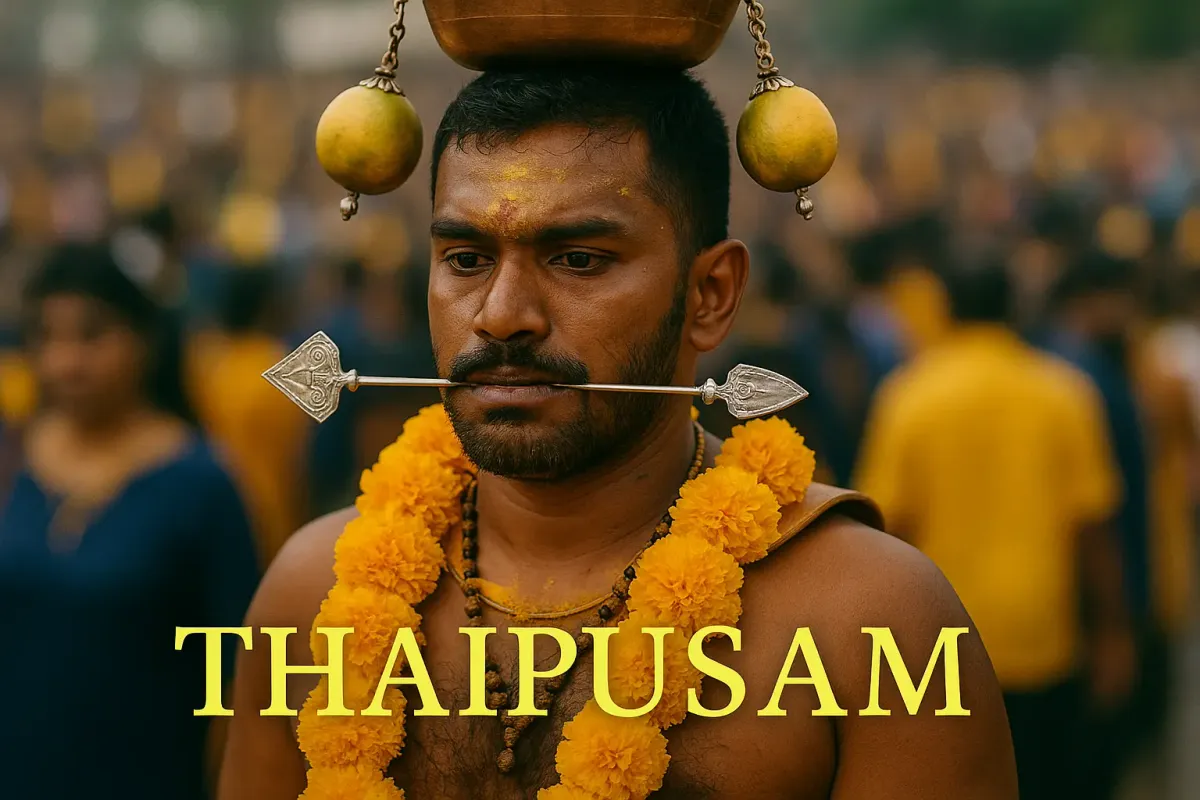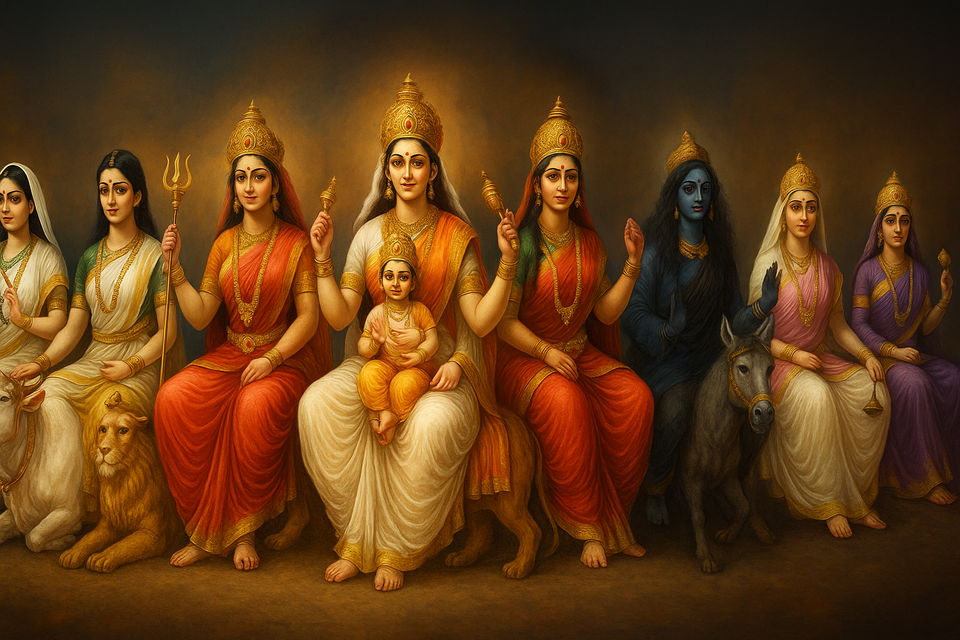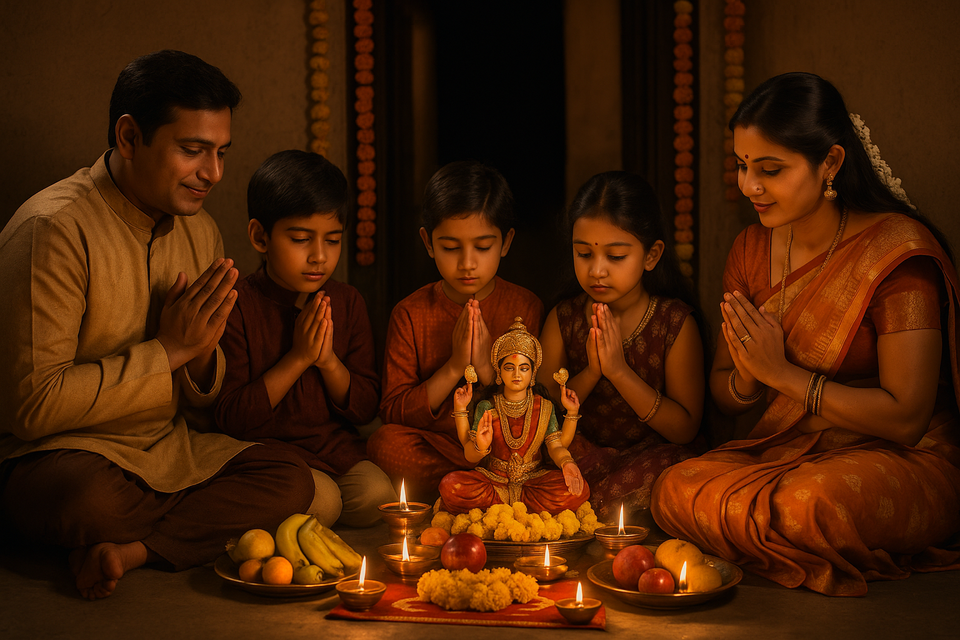Thaipusam: A Vibrant Festival Honoring Lord Murugan 🌟
Celebrate Thaipusam 2026, honoring Lord Murugan! Learn its history, rituals like kavadi, and how to join vibrant festivities in Malaysia and Tamil Nadu. Embrace devotion and triumph! 🙏

Thaipusam, a dynamic Hindu festival, celebrates Lord Murugan (also known as Kartikeya or Subrahmanya), the divine warrior and son of Lord Shiva and Goddess Parvati. Observed on the full moon day in the Tamil month of Thai (January–February), Thaipusam is a time of intense devotion, marked by colorful processions, body piercings, and offerings of gratitude. Renowned for its spectacular kavadi rituals and fervent prayers, Thaipusam is a major event in Tamil Nadu, Malaysia, Singapore, Sri Lanka, and Tamil diaspora communities worldwide.
For a deeper understanding of India’s rich festival traditions, explore Ancient Festivals of India.
Historical Background of Thaipusam 📜
The origins of Thaipusam are rooted in Hindu mythology and Tamil traditions, with references found in texts like the Skanda Purana and Tamil devotional works. According to legend, Thaipusam commemorates the day when Goddess Parvati bestowed the divine spear (Vel) upon Lord Murugan to defeat the demon Soorapadman, symbolizing the triumph of good over evil. The festival also marks Murugan’s birthday in some traditions, celebrating his divine birth and valor.
Historically, Thaipusam has been observed for centuries in South India, particularly in Tamil Nadu, where Murugan is revered as the patron deity. The festival gained prominence during the Chola dynasty (9th–13th centuries CE), with temple inscriptions noting grand celebrations at sites like Palani. In the 19th century, Tamil migrants brought Thaipusam to Malaysia and Singapore, where it evolved into a global spectacle, especially at Kuala Lumpur’s Batu Caves.
The modern Thaipusam festival, particularly in Malaysia, attracts over 1.5 million devotees annually, with processions and kavadi rituals drawing international attention. Its historical significance lies in its role as a cultural and spiritual bridge, uniting Tamil communities across borders. 🌍
Mythological and Spiritual Significance of Thaipusam ✨
Thaipusam holds profound spiritual and mythological importance, embodying themes of devotion, sacrifice, and divine grace. Here are key aspects of its significance:
- Victory Over Evil: Thaipusam celebrates Murugan’s triumph over Soorapadman, symbolizing the conquest of ego, ignorance, and negativity through divine intervention.
- Divine Grace of Murugan: Devotees seek Murugan’s blessings during Thaipusam for courage, wisdom, and protection, viewing him as a compassionate guide.
- Penance and Gratitude: The kavadi ritual, involving body piercings and physical endurance, is a form of penance or thanksgiving for answered prayers during Thaipusam.
- Spiritual Purification: Fasting, prayers, and temple visits during Thaipusam purify the mind and body, fostering a deeper connection with the divine.
- Community Devotion: Thaipusam unites devotees in collective worship, reinforcing Tamil cultural identity and spiritual solidarity.
The spiritual essence of Thaipusam lies in its call to surrender to Murugan’s grace, as reflected in the Tamil chant: “Arohara! Vel Muruga!” 🌼
Cultural Importance of Thaipusam 🎭
Thaipusam is a cultural cornerstone that showcases Tamil heritage through vibrant rituals, music, and community spirit. Its cultural significance includes:
- Artistic Expression: Thaipusam features ornate kavadis (decorated carriers), traditional music like nadaswaram, and dance performances, celebrating Tamil artistry.
- Culinary Traditions: Devotees prepare vegetarian offerings like pongal, vadai, and payasam during Thaipusam, shared as prasadam to foster communal bonding.
- Devotional Literature: Hymns like Thiruppugazh and Kanda Shasti Kavasam are recited during Thaipusam, preserving Tamil linguistic and spiritual heritage.
- Community Unity: Thaipusam brings together Tamils of all backgrounds, with families and volunteers collaborating in processions and temple activities.
- Economic Impact: The festival boosts local economies, with markets selling flowers, kavadis, and puja items thriving during Thaipusam in places like Kuala Lumpur and Palani.
The cultural vibrancy of Thaipusam lies in its blend of devotion and festivity, making it a global celebration of Tamil identity. 🌈
For insights into India’s sacred sites, visit Shiva Temples In India.
Rituals and Traditions of Thaipusam 🛕
Thaipusam is marked by a series of rituals that blend intense devotion, physical endurance, and vibrant celebrations, typically spanning one to three days. Here’s a detailed look at the key rituals of Thaipusam:
1. Fasting and Preparation 🍉
Devotees undertake a 48-day preparatory period before Thaipusam, fasting, abstaining from worldly pleasures, and chanting prayers to purify themselves. Vegetarian diets and daily Murugan worship are common.
2. Kavadi Attam (Burden Dance) 💃
The iconic kavadi ritual is central to Thaipusam, where devotees carry decorated carriers (kavadi) on their shoulders, often with body piercings (cheeks, tongue, or skin) using needles or hooks. This act of penance or gratitude symbolizes surrender to Murugan.
3. Piercing Rituals 🪡
During Thaipusam, devotees undergo ritual piercings without anesthesia, performed by trained priests, as a test of faith. Common piercings include Vel (spear) through the cheeks or alagu (hooks) on the back, endured in a trance-like state.
4. Processions to Temples 🚩
Grand processions mark Thaipusam, with devotees walking barefoot to temples like Batu Caves (Malaysia) or Palani (India), carrying kavadis or milk pots (paal kudam). Chanting “Vel Vel!” and music accompany the journey.
5. Abhishekam and Puja 🙏
Temples perform abhishekam, bathing Murugan’s idol with milk, honey, and sandalwood, during Thaipusam. Devotees offer:
- Flowers: Lotus or jasmine.
- Fruits: Coconuts or bananas.
- Sweets: Payasam or laddu.
Mantras like Subrahmanya Ashtakam are chanted for blessings.
6. Milk Offering (Paal Kudam) 🥛
Some devotees carry pots of milk on their heads during Thaipusam, offering it to Murugan’s idol as a symbol of purity and devotion.
7. Devotional Music and Dance 🎶
Thaipusam features bhajans, kirtans, and traditional dances like Kummi or Kolattam at temples, creating a festive atmosphere. Drummers and nadaswaram players energize processions.
8. Charity and Prasadam Sharing 🤝
Devotees distribute food and essentials to the needy during Thaipusam, sharing prasadam like pongal or vadai with fellow worshippers, embodying Murugan’s compassion.
9. Eco-Friendly Practices 🌱
Recent Thaipusam celebrations promote biodegradable kavadis and waste management at temple sites, reflecting environmental consciousness, especially in Malaysia and Singapore.
These rituals make Thaipusam a powerful celebration of devotion, resilience, and cultural heritage. 🎊
Celebrations Across the World 🌍
Thaipusam is celebrated with immense fervor in Tamil Nadu, Malaysia, Singapore, Sri Lanka, and global Tamil communities, each with unique traditions. Here’s how it’s observed:
- Tamil Nadu: Palani’s Dhandayuthapani Temple and Tiruchendur’s Murugan Temple are major Thaipusam hubs, with thousands carrying kavadis and performing piercings. Processions attract over 1 million devotees.
- Malaysia: Kuala Lumpur’s Batu Caves is the global epicenter of Thaipusam, with 1.5 million attendees climbing 272 steps to offer kavadis. The Sri Subramaniar Swamy Temple hosts vibrant processions.
- Singapore: The Sri Thendayuthapani Temple organizes Thaipusam with a 4-km procession from Serangoon Road, drawing 50,000 devotees despite strict piercing regulations.
- Sri Lanka: Jaffna’s Nallur Kandaswamy Temple and Kataragama host Thaipusam with kavadi dances and fire-walking, blending Tamil and Sinhala traditions.
- Global Celebrations: Tamil diaspora in the USA (Cary, North Carolina), UK (London), Canada (Toronto), and Australia (Sydney) celebrate Thaipusam with temple pujas, processions, and virtual broadcasts.
The festival’s universal appeal fosters devotion and cultural pride, uniting Tamils worldwide during Thaipusam. 🌏
Modern Relevance of Thaipusam 🌐
As of June 5, 2025, Thaipusam remains a vibrant symbol of spiritual devotion, cultural identity, and global unity, adapting to modern contexts. Its contemporary significance includes:
- Cultural Preservation: Thaipusam keeps Tamil traditions like kavadi and Thiruppugazh alive, with digital platforms sharing rituals and music globally.
- Tourism Boost: Thaipusam attracts international visitors, especially to Batu Caves, contributing to Malaysia’s tourism revenue (RM 100 million in 2024).
- Community Engagement: The festival fosters social initiatives like free food stalls and medical camps, aligning with modern welfare goals during Thaipusam.
- Environmental Awareness: Eco-friendly kavadis and temple cleanups during Thaipusam reflect growing sustainability efforts, as seen in Singapore’s 2024 celebrations.
- Digital Reach: Live-streamed processions, mobile apps, and social media amplify Thaipusam’s global reach, with X posts showcasing Batu Caves’ vibrant scenes.
The festival’s blend of tradition and modernity ensures its relevance, with plans for grand 2026 Thaipusam celebrations in Malaysia and Tamil Nadu.
How to Celebrate Thaipusam at Home 🏠
Planning to celebrate Thaipusam? Here’s a step-by-step guide for a meaningful celebration:
- Prepare Spiritually: Begin a vegetarian diet and daily prayers 48 days before Thaipusam, chanting Kanda Shasti Kavasam to purify your mind.
- Set Up a Puja Space: Clean your home and create an altar with a Murugan idol or picture, decorated with flowers and lamps for Thaipusam.
- Perform Puja: Offer pongal, bananas, and jasmine flowers, chanting Subrahmanya Ashtakam or Vel Muruga during Thaipusam morning rituals.
- Observe a Fast: Fast on Thaipusam day, consuming only water or fruits, to express devotion and discipline.
- Watch Processions: Stream Thaipusam processions from Batu Caves or Palani temples, joining virtually in kavadi rituals.
- Prepare Prasadam: Cook vadai or payasam as offerings and share with family as prasadam during Thaipusam.
- Engage in Charity: Donate food or essentials to the needy, reflecting Murugan’s compassion during Thaipusam.
- Join Virtual Events: Participate in online pujas or temple broadcasts, connecting with global devotees during Thaipusam.
- Share Greetings: Send Thaipusam wishes via WhatsApp or Instagram, with messages like “Happy Thaipusam! May Murugan’s Vel guide you to victory!”
These steps ensure a heartfelt and authentic Thaipusam celebration at home. 🎈
Practical Information for Visitors 🌍
Planning to experience Thaipusam in 2026? Here’s what you need to know as of June 5, 2025:
- Best Places to Visit: Batu Caves (Kuala Lumpur), Palani (Tamil Nadu), or Sri Thendayuthapani Temple (Singapore) for vibrant Thaipusam celebrations.
- Timing: Thaipusam is expected around January 30–31, 2026, based on the Tamil calendar’s full moon in Thai. Check temple schedules for exact dates.
- How to Reach:
- By Air: Kuala Lumpur International Airport (50 km from Batu Caves), Madurai Airport (100 km from Palani), or Singapore Changi Airport connect to major cities.
- By Train: Kuala Lumpur Sentral, Palani, and Singapore Woodlands are accessible stations near Thaipusam sites.
- By Road: Highways connect these locations with buses and taxis.
- Accommodation: Book hotels in advance, e.g., Hilton Kuala Lumpur, Hotel Tamilnadu (Palani), or Marina Bay Sands (Singapore), due to high demand during Thaipusam.
- Etiquette: Dress modestly, remove footwear at temples, and avoid photographing devotees without consent during Thaipusam rituals.
- Safety Tips: Stay hydrated, avoid crowded areas during processions, and follow temple guidelines for a safe Thaipusam experience.
Visiting during Thaipusam offers a unique glimpse into Tamil culture’s spiritual and festive vibrancy. 🛫
Conclusion 🌄
Thaipusam is a radiant celebration of Lord Murugan’s divine grace, uniting devotees in devotion, sacrifice, and cultural pride. From kavadi rituals and body piercings to temple processions and Thiruppugazh hymns, Thaipusam offers a rich tapestry of traditions that inspire spiritual growth and community bonding. Its historical, spiritual, and modern significance makes it a cherished festival across Tamil communities worldwide. Whether you’re a devotee seeking Murugan’s blessings or a visitor exploring Tamil heritage, Thaipusam promises an unforgettable experience. Embrace the spirit of Thaipusam and celebrate the triumph of devotion with fervor! 🪔





